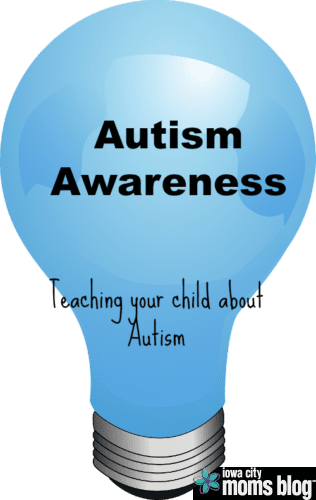April is Autism Awareness month! According to the CDC, 1 in 68 children has been identified as having an Autism Spectrum Disorder (ASD). With the increasing prevalence of the disorder, it is more and more common that you will know someone who has ASD, possibly a member of your family, friends, or neighbors. ASD can affect all areas of functioning, including difficulties with speech, social skills, motor skills, balance, and coordination. The disorder is known as a “spectrum” disorder because individuals experience different levels of impairment along the autism spectrum. No one really knows what causes ASD, although there are many theories being researched in the medical community.

One thing that is certain about individuals with ASD is that they experience the world very differently than people with “neurotypical” brains. Children with ASD may experience things like touch, sound, smells, or sights in a more intense manner. They may not be able to cope with noisy environments in the same way that other children do and may try to escape from situations that cause them stress and anxiety. They may not have a good awareness of their own bodies or their own space, causing them to have trouble with motor skills and coordination. They may have difficulty communicating, and they may have meltdowns when stimulation gets to be just too much.
Since ASD is so very common, sooner or later your child will likely encounter another child with some level of autism. Below are some ways to help them to understand the challenges that this child might be facing that might make them display behaviors that are different, difficult, or confusing.
Tips for teaching your child about Autism:
- Help your child to understand how the child with autism might be experiencing the world. You can explain that some people’s brains work differently than others, and that sounds might sound louder to the other child or more irritating. Explain that if the other child is having a meltdown, it isn’t because he is being naughty, it is because his brain has taken in more than he can handle for the moment.
- If the child is demonstrating behaviors that seem strange, such as hand flapping or finger clicking, you can explain to your child that these behaviors might be his way of communicating with others, or might help him to calm when he is upset. Compare it to something your own child does for comfort, such as hugging a stuffed animal or listening to music.
- Look for books about autism to read together with and talk about with your child. The organization Autism Speaks has a great listing of books and resources for all ages, including picture books for children.
- If possible, talk to the parents of the child with autism. They will be able to give you insight into their child’s individual likes and dislikes, as well as the best way to engage her in play and friendship.
Above all, let’s teach our children that people with autism are people first – individual people with individual talents, likes, dislikes, and personalities. The best thing that we can do is get to know them as people, and to appreciate the things that make them unique and special.
We are fortunate in the corridor area to have resources available to help children with ASD. If you have a child with autism, or if you are concerned about your child’s language or social development, talk to your child’s physician about these and other resources and options.
Iowa City area resources for those affected by autism:
Witwer Children’s Therapy Center
Center for Disabilities and Development (UIHC)
Enrichment Therapy and Learning Center
Whether you know someone with ASD or not, we invite all of you to become partners in not only promoting autism awareness, but in furthering the cause of acceptance and appreciation for all people.











Articles like this make me so proud to see awareness being brought about. For example, with Julia now on Seasame Street, how cool is that?! Anyway, I saw that Mercy Pediatrics is able to get our little ones in quickly for Autism, ADHD and Behavioral consults as well!